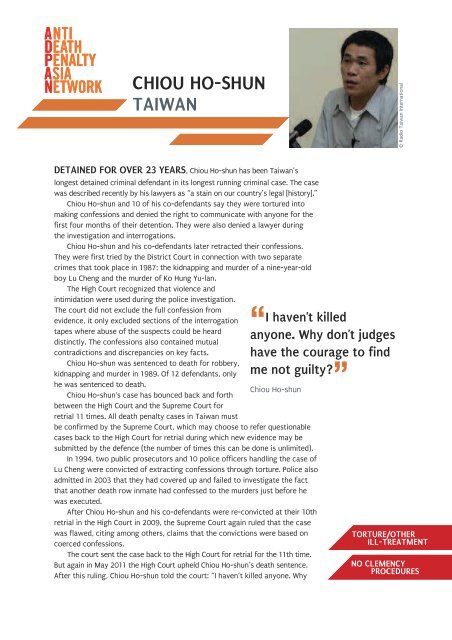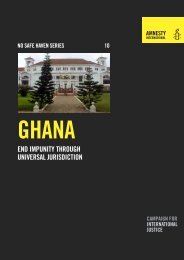Injustice - Amnesty International Schweiz
Injustice - Amnesty International Schweiz
Injustice - Amnesty International Schweiz
You also want an ePaper? Increase the reach of your titles
YUMPU automatically turns print PDFs into web optimized ePapers that Google loves.
CHIOU HO‐SHUN<br />
TAIWAN<br />
© Radio Taiwan <strong>International</strong><br />
DETAINED FOR OVER 23 YEARS, Chiou Ho‐shun has been Taiwan’s<br />
longest detained criminal defendant in its longest running criminal case. The case<br />
was described recently by his lawyers as “a stain on our country’s legal [history].”<br />
Chiou Ho‐shun and 10 of his co‐defendants say they were tortured into<br />
making confessions and denied the right to communicate with anyone for the<br />
first four months of their detention. They were also denied a lawyer during<br />
the investigation and interrogations.<br />
Chiou Ho‐shun and his co‐defendants later retracted their confessions.<br />
They were first tried by the District Court in connection with two separate<br />
crimes that took place in 1987: the kidnapping and murder of a nine‐year‐old<br />
boy Lu Cheng and the murder of Ko Hung Yu‐lan.<br />
The High Court recognized that violence and<br />
intimidation were used during the police investigation.<br />
The court did not exclude the full confession from<br />
evidence, it only excluded sections of the interrogation<br />
tapes where abuse of the suspects could be heard<br />
distinctly. The confessions also contained mutual<br />
contradictions and discrepancies on key facts.<br />
Chiou Ho‐shun was sentenced to death for robbery,<br />
kidnapping and murder in 1989. Of 12 defendants, only<br />
he was sentenced to death.<br />
Chiou Ho‐shun's case has bounced back and forth<br />
between the High Court and the Supreme Court for<br />
retrial 11 times. All death penalty cases in Taiwan must<br />
be confirmed by the Supreme Court, which may choose to refer questionable<br />
cases back to the High Court for retrial during which new evidence may be<br />
submitted by the defence (the number of times this can be done is unlimited).<br />
In 1994, two public prosecutors and 10 police officers handling the case of<br />
Lu Cheng were convicted of extracting confessions through torture. Police also<br />
admitted in 2003 that they had covered up and failed to investigate the fact<br />
that another death row inmate had confessed to the murders just before he<br />
was executed.<br />
After Chiou Ho‐shun and his co‐defendants were re‐convicted at their 10th<br />
retrial in the High Court in 2009, the Supreme Court again ruled that the case<br />
was flawed, citing among others, claims that the convictions were based on<br />
coerced confessions.<br />
The court sent the case back to the High Court for retrial for the 11th time.<br />
But again in May 2011 the High Court upheld Chiou Ho‐shun’s death sentence.<br />
After this ruling, Chiou Ho‐shun told the court: “I haven’t killed anyone. Why<br />
“<br />
I haven’t killed<br />
anyone. Why don’t judges<br />
have the courage to find<br />
me not guilty<br />
”<br />
Chiou Ho‐shun<br />
TORTURE/OTHER<br />
ILL‐TREATMENT<br />
NO CLEMENCY<br />
PROCEDURES
















